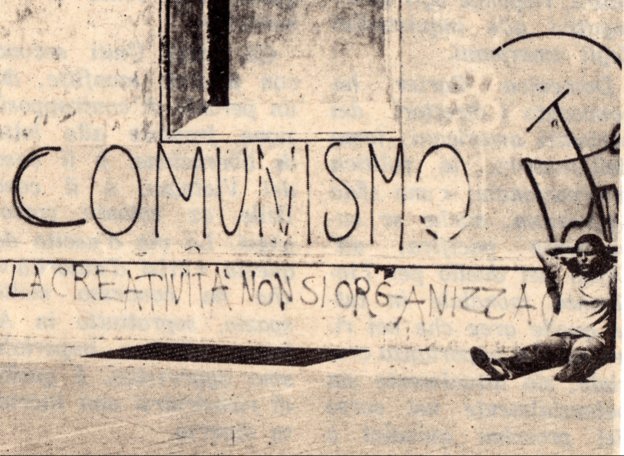[Two more translated Italian communist texts from the '70s. These need no introduction, as nearly everything they say still applies today. Both are from 1976. Both are fierce, enraged, subtle, and sharp as hell.]
“On the Men’s Movement”†
“Retake our lives”†
This is the bottleneck†
 The term is strettoia. It’s used particularly in the sense of a road that narrows and hence produces a traffic jam. In other words, a structural cause that hides itself behind the effects it produces: we don’t see the road narrow until we are past it, until we’ve already blamed - and raged against - the traffic itself, the other drivers. For this reason, it indicates a misprision that generates the “reformist program of struggle for life,” because it can recognize only the effects, not the real cause.
The term is strettoia. It’s used particularly in the sense of a road that narrows and hence produces a traffic jam. In other words, a structural cause that hides itself behind the effects it produces: we don’t see the road narrow until we are past it, until we’ve already blamed - and raged against - the traffic itself, the other drivers. For this reason, it indicates a misprision that generates the “reformist program of struggle for life,” because it can recognize only the effects, not the real cause.A crisis of relations, a crisis of sexuality, a crisis of identity itself: these are the lacerations that the women’s struggle has inflicted. But they want to overcome this crisis immediately, cutting the time of our struggle, requiring a reform of our relation with them right away. The proper adjustment of us to their new exigencies, to their new needs.
They want from us a new mode of working.
But our struggle is revolutionary, it gets to the bottom of things! It is entirely against labor, it is for its destruction.
The struggle of women: this is the engine that has completely upset the capitalist life of workers, of proletarians, of students. But we are proud of it. The struggle of women against everyday domestic labor: life as labor, always. Affects as labor, sexuality as labor, smiles as labors, caresses as labor, even dreams are wearily worked. The misery of the everyday had a name, a cause: domestic labor. Life as domestic labor carried out by women, yet lived and interpreted by men.
You want to reappropriate life for yourselves?
In the meantime, destroy the bosses that are in you, destroy the capitalistic characteristics within you. Destroy yourselves as our bosses. Destroy yourselves as the inexhaustible vacuums of our domestic labor.†
There’s no other way out.
The result of our struggle, of the destruction of our quotidian, of the misery of our quotidian, is often the desert: the desert of smiles, glances, gestures, words, attention, affect, sentiment, love, tenderness.
When the flowers of the garden no longer smell sweet, when the leaves refuse to bloom and the birds to sing, the bosses of the garden go into crisis. But it is a healthy crisis. It is the crisis of relations of power. But power must be destroyed, not reformed. And so?
Comrades: stick around and listen to women, watch what women do, clap your hands and be happy because the path to pleasure has finally been blazed.†
But don’t accelerate the time this requires, otherwise you will gather only the fruit of a reformism of life. And that’s a fruit that stinks of death.
from <<Le operaie della casa>>, June-July, ‘76
 Bitter fruit is a dish best served with rage and poise.
Bitter fruit is a dish best served with rage and poise.
“We Liberate Our Rage”
The violence to which women must submit daily in relation to the man is itself a political fact. And a true one, so much so as to become habit, resignation, self-repression.
We say enough to the habit of violence. Every woman killed during an abortion or for not having been able to have one is a fact that we take personally.
As we take personally every woman executed for being guilty of fighting this State with arms in hand: Anna Maria Mantini and Mara†
A woman who makes a revolutionary choice is either “chubby and insignificant” or “sacrifices herself on the battlefield” to “shield the body of her husband” or is complicated, or is wife or mother or lover, but never a person.
To not denounce the executors and mandators of these crimes of state-Church-patriarchal society is also a “habit” of violence, impotence, and complicity. To recognize these as our facts, facts of women, means knowing that in order to reappropriate our personhood as a totality, we must liberate our rage, our aggressivity, we must desecrate, strike, and demolish what is opposed to our liberation.
It’s no accident that today women descend by the thousands into the piazza, in Rome, in Milan, in Padova; they fight with the cops, and even if they are disorganized and in a little group†
Women are sick of suffering violence. Today they want to express their own violence, matured over centuries of oppression, to exit from immobility, to reappropriate for all the spaces that belong to them.
Several Milanese feminist groups
